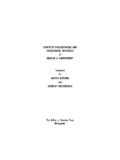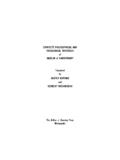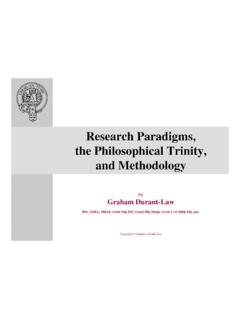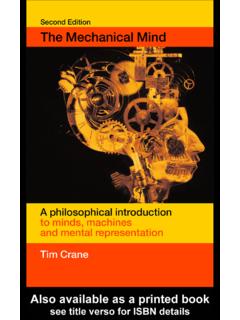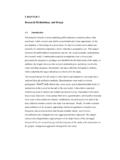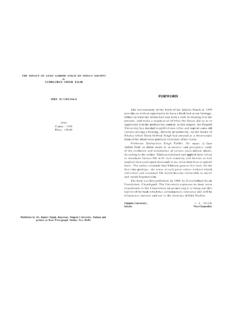Transcription of COMPLETE PHILOSOPHICAL AND THEOLOGICAL …
1 COMPLETE PHILOSOPHICAL AND. THEOLOGICAL TREATISES. of ANSELM of CANTERBURY. Translated by JASPER HOPKINS. and HERBERT RICHARDSON. The Arthur J. Banning Press Minneapolis In the notes to the translations the numbering of the Psalms accords with the Douay version and, in parentheses, with the King James (Authorized) version. A reference such as S II, 264:18 indicates F. S. Schmitt's edition of the Latin texts, Vol. II, p. 264, line 18. This online translation of the proslogion is taken from A New, Interpretive Translation of St. Anselm's Monolo- gion and proslogion (Minneapolis: Banning Press, 1986).
2 The Latin text, collated by Hopkins and published in the foregoing work, is not here reprinted. Library of Congress Control Number: 00-133229. ISBN 0-938060-37-6. Printed in the United States of America Copyright 2000 by The Arthur J. Banning Press, Minneapolis, Minnesota 55402. All rights reserved. proslogion . PREFACE 1. Upon the insistent adjurations of certain brothers I wrote a work . as an example of meditating about the rational basis of faith in the role of someone who by arguing silently with himself investi- gates what he does not yet know.
3 Afterwards, considering this [work] to be composed of a chain of many arguments, I began to ask myself whether perhaps a single consideration could be found which would require nothing other than itself for proving itself and which would suffice by itself to demonstrate (1) that God truly [ , really] exists and (2) that He is the Supreme Good (needing no one else, yet needed by all [else] in order to exist and to fare well) and whatever [else] we believe about the Divine Substance. I often and eagerly directed my thinking to this [goal].
4 At times what I was in quest of seemed to me to be apprehensible; at times it completely eluded the acute gaze of my mind. At last, despair- ing, I wanted to desist, as though from pursuit of a thing which was not possible to be found. But just when I wanted completely to exclude from myself this thinking lest by occupying my mind in vain, it would keep [me] from other [projects] in which I could make headway just then it began more and more to force itself insistently upon me, unwilling and resisting [as I was]. Then one day when I was tired as a result of vigorously resisting its en- treaties, what I had despaired of [finding] appeared in my strife- torn mind in such way that I eagerly embraced the [line-of-]think- ing which I, as one who was anxious, had been warding off.
5 Sup- posing, then, that if what I rejoiced to have discovered were writ- ten down it would please its readers, I wrote the following work on this [subject], and on various others, in the role of someone en- deavoring to elevate his mind toward contemplating God and in the role of someone seeking to understand what he believes. And I deemed neither this present [writing] nor the one mentioned above to be worthy to be called a treatise or to be something to which the name of the author should be prefixed; and, neverthe- less, I thought that they should not be circulated without titles, by 1.
6 The proslogion was composed at the Monastery of Bec around 1077-1078. 88. proslogion Preface 89. which in some way they would issue to anyone into whose hands they came an invitation to read them. Hence, I gave a title to each, so that the first was called An Example of Meditating about the Ra- tional Basis of Faith and the second was called Faith Seeking Un- derstanding. But after several people had already copied both [works] under these [respective] titles, I was urged by several to prefix my name to these [writings urged] especially by Hugh, the reverend archbishop of Lyon, who was serving as apostolic legate in Gaul and who on the basis of his apostolic authority directed me to do this.
7 In order for the [affixing of my name] to be done more fittingly, I retitled the former [writing] Monologion, , a so- liloquy, and the present [writing] proslogion , , an address. CHAPTER-TITLES. 1. Arousal of the mind for contemplating God. 2. God truly [ , really] exists. 3. [God] cannot be thought not to exist. 4. How the Fool said in his heart that which cannot be thought. 5. God is whatever it is better to be than not to be. Alone exist- ing through Himself, He makes all other things from nothing. 6. How God is able to perceive even though He is not something corporeal.
8 7. How He is omnipotent even though He cannot do many things. 8. How He is merciful and impassible. 9. How He who is completely and supremely just spares those who are evil. He is justly merciful to them. 10. How He justly punishes and justly spares those who are evil. 11. How all the ways of the Lord are mercy and truth, and yet, the Lord is just in all His ways.. 12. God is the life by which He lives, and similarly for similar [attributes]. 13. How He alone is unlimited and eternal, although other spir- its are [also] unlimited and eternal.
9 14. How and why God is both seen and not seen by those who seek Him. 15. He is greater than can be thought. 16. This is the inaccessible light in which He dwells. 17. Harmony, fragrance, succulence, softness, and beauty are 90 proslogion 1. present in God in their own ineffable manner. 18. There are no parts in God or in the eternity which He is. 19. He is not in place or in time; but all things are in Him. 20. He is before and beyond all things even eternal things. 21. Whether this [eternity] is one aeon or more than one. 22 He alone is what He is and who He is.
10 23. The Father, the Son, and the Holy Spirit are equally this [supreme] good. It is the one necessary [Being], which is every good, COMPLETE good, and the only good. 24. A conjecture about what kind of good this is and about how great it is. 25. The kinds and the quantity of goods for those who enjoy this [Good]. 26. Whether this is the full joy which the Lord promises. proslogion . CHAPTER ONE. Arousal of the mind for contemplating God. Come now, insignificant man, leave behind for a time your pre- occupations; seclude yourself for a while from your disquieting thoughts.
